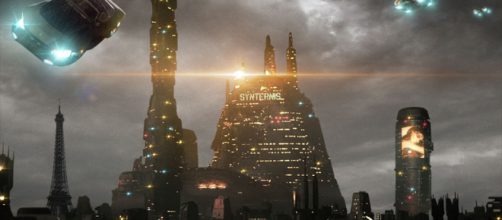Producer Guy-Robert Duvert started his career in music, not movies. He studied at the lauded Conservatoire where he learned piano and later, worked as an indie composer. He later moved into the field of producing, while also providing the score for many of the films that he produced.
In 2014, Guy crossed over into filmmaking via a short film titled “Cassandra” which subsequently resulted in him transitioning into feature-length filmmaking with the science fiction feature titled “2047: Virtual Revolution” which was released in January of 2018 courtesy of Wild Eye Releasing.
Akin to the classic film “Blade Runner,” Guy’s movie takes place in the future and tells the tale of an agent who is assigned the mission of taking down terrorists who are compelled to destroy the virtual worlds that the vast majority of the populace lives in.
Guy recently spoke about his films, his hopes for the future, and more via an exclusive interview.
Movies, music, producing and directing
Meagan Meehan (MM): How did you get your start in movies and what was your breakthrough moment when you actually got to film something?
Guy-Robert Duvert (GRD): I always loved creating stories, and I'm a big movie and TV watcher, so eventually I linked the two trends. Also, I've worked for so long of others people’s movies that, after a while, I really wanted to try to make my own too.
I started in the industry as a film music composer, activity that I still have now. I've scored several feature films, some video games and blockbusters trailers (“Transformers 3,” “Green Lantern,” “Prometheus,” “Power Rangers,” among others). After a while, I got this itch I wanted to scratch, so I made my first short movie. It was an imperfect film, but it was beautiful, so it helped me to have some new opportunities. For a few years, I shot some corporate movies. Eventually, I shot my second short film, which was my way into my first feature film.
Funny enough, my first time shooting anything was a corporate movie! The money wasn't huge, but it was great to be paid to film. Getting that money was useful in paying the rent!
And so, that's how I became a director and a producer.
MM: What sort of cameras and equipment do you favor?
GRD: It really depends on the opportunities. Typically, I love the Arri Alexa. My DP tends to love the Red Dragon. But at the end, we ended up shooting Virtual Revolution with 2 Sony F55, because we got a great deal for them, and we were really happy with the result. In the end, it's a little bit like choosing between a Lamborghini, a Ferrari, and a Jaguar. One can have a preference, but eventually, there is no real wrong choice.
MM: Let’s say you suddenly lost your muse for movies--what another career would you pursue then?
GRD: What I'm already doing: composing music! That being said, if I had plenty of time, I'd also love to learn how to draw.
I work a lot with concept artists, and I admire what they do. I'd love to be able to do the same
Science fiction, plots, and new projects
MM: How did the storyline for “2047: Virtual Revolution” come to you and why was this particular science fiction concept so appealing?
GRD: It was all because of an article I read in 2005, saying that 25% of the players of a specific online video game, “Everquest 2,” were paying more importance to their virtual life in the game than to their real life. I realized that the technology was going to evolve a lot, and that, eventually, virtual reality would feel as real as reality (which guys like Kurweitz predict for the 2030s). When that happens, it won't be 25%, but much more.
That's how I imagined a society where 75% of the population spend all their time online, not caring about reality anymore.
Visually, I really wanted to do a tech-noir movie. This genre consists in mixing the codes of film noir with science fiction. The film that invented the codes was “Blade Runner” in 1982. And I love the philosophy of anticipation: asking now questions we'll have to answer in the future. Concretely, virtual reality will strongly impact our societies. I like the whole plot, the idea of thinking now about what could happen in a close future and how.
MM: Did you have a substantial say in the casting of this film?
GRD: Yes, I produced the film, so basically, there was no disagreement between me (director) and myself (producer).
I actually had noticed Mike Dopud, the lead actor, several years earlier, with his role in “Stargate Universe.” I was convinced he was lead role material, and “Virtual Revolution” proved me right. Having Jane Badler (from the TV show “V”) was also a real pleasure. For the rest of the cast, we did it very traditionally, with auditions.
MM: Do you have any exciting new projects on the horizon, where are you going from here, and have you any advice for newbies?
GRD: I have several upcoming projects, actually. We are working on a TV show inspired by the film “Virtual Revolution.” We also are preparing a few new feature films. Two are now fully developed and are starting the financing phase.
I love making movies and making a living from it!
In a decade I will still be a director and still a composer, with a higher recognition. Still working on movies.
My advice to newcomers is: don't wait for someone to discover you. Do your thing, create! Don't hesitate to produce your own first projects. People won't discover you because you have potential, they will discover you once you've already started proving you have some.


